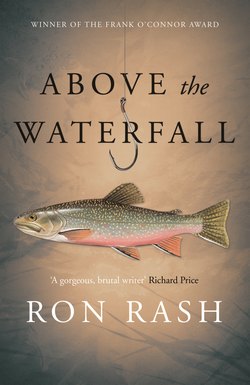Читать книгу Above the Waterfall - Ron Rash - Страница 10
На сайте Литреса книга снята с продажи.
ОглавлениеFour
The school bus pulls into the lot and children stream from it into the world. They gather around the cedar announcement board, on it the brass plaque I placed there my first day.
HOW NEAR AT HAND IT WAS
IF THEY HAD EYES TO SEE IT.
—G. M. Hopkins
I go through my usual protocol. No cameras or cell phones, not even for the teacher. Then we cross the bridge, go upstream where I show them cardinal flowers and bee balm, a mantis greenblended on a blackberry bush.
“It can change shades of color,” I tell them and set the mantis on a dogwood limb. “If it stays, you will see.”
I lead them to where joe-pye stems anchor low clouds of lavender.
“Did you know flowers grew so high?” I ask.
Solemn head shakes.
“I bet there is something else you don’t know, that jaguars and parakeets once lived in these mountains. Most people think the parakeets have been gone for over a hundred years, but I know a man who says he saw some in 1944. I want to believe a few might still be around, don’t you?”
The children nod.
I show them an empty hummingbird’s nest, let them touch a box turtle’s shell, other things. Last, we walk up above the bridge and sit on the stream bank. I point to a trout holding its place in the current.
“Let’s try something,” I say. “If you had a friend who’d never seen a fish swimming in a stream, what would you tell that friend the fish looks like? Think about that for a few minutes, without talking.”
I watch and I too see something new, how the trout appears to weave the very water it is in. As if the world’s first fish lay in dust, but with each fin and flesh thrum brought forth more water, soon whole rivers, then oceans. Taliesin in the coracle, the salmon of knowledge: all the world’s wisdom waterborne, water born. Welsh notions Hopkins would have known.
“So what would you say to your friend?” I ask.
Several say a flag and the other children chime in.
“On a windy day.”
“Not too windy.”
“With lots and lots of rain.”
“A brown flag with red spots.”
“What if your friend asked how the fish was different from a flag?” I ask.
“No pole.”
“It can’t get dirty.”
“Or be folded.”
“Flags don’t have eyes.”
“Or mouths.”
“Flags don’t eat bugs.”
The teacher nods at her watch, says it’s time to leave. As the orange bus drives away, a child peers through the back window. Behind the glass she mouths words as she waves at me. Memory scalds. Not the orange-bright of buses we ran toward that morning but minutes before, in the classroom as Ms. Abernathy lined us up. You must be as quiet as you can, children, she had told us. Promise me that you won’t say a single word. More memories come of the days and months after that morning: the room with big chairs and magazine-filled tables, a smaller room full of soft questions, a pair of black-framed glasses behind which huge eyes urged spoken answers, not head shakes. One night, my father thinking me asleep: The other children are getting over it fine, why can’t she? We’ve tried everything and it’s cost us a fortune. What your parents offered, well, let them have her. At least we’ll have a break from all this.
I close my eyes. Wash away, I whisper. Wash away, wash away. I walk down the loop trail, pass foxglove past bloom. Midsummer their flowers dangled like soft yellow bells. I’d wished them a breeze so they might silently ring. The same yellow as Van Gogh’s sunflowers. Vincent’s thick paint, like Hopkins’ thick sounds. Such grace-giving from supposed failed priests. I think of reading Hopkins in those days after Richard was killed. A failed priest saved my soul.
What would he see if here? I ask. I pick up a Fraser fir cone. A hollowed lightness like a thimble, spring’s green weight gone. The edges are strong-keeled as viper scales, wing seeds wedged in the slits. High in a white oak, a flicker searches for grubs. The bird’s too blended to see at first but then the red nape reveals and tree bark softens into feathers. The flicker’s tap-bursts and pauses: a thoughtful message typed. Where the trail skirts the creek, a stand of silver birch, then a gap where sun and water pool. On a granite outcrop, a five-lined skink. Plestiodon fasciatus. Its throat fills and sags but no other movement, a chameleon of stillness. Indigo body coppered with stripes that chevron on the head. The back feet frog cocked, the tail a bright blue fuse. I too feel the heatsoak of sun and stone, the human in me unshackling.
